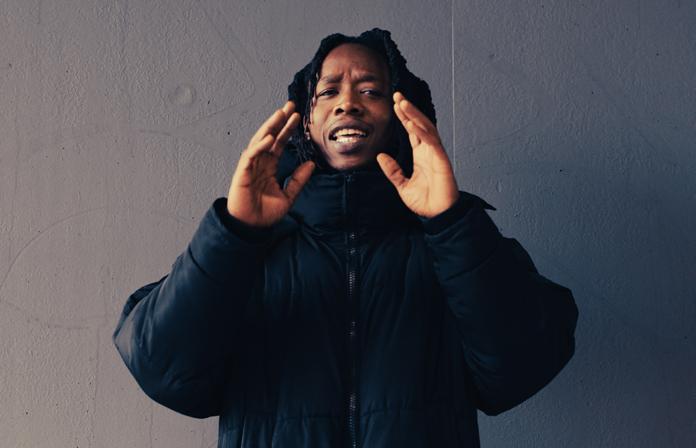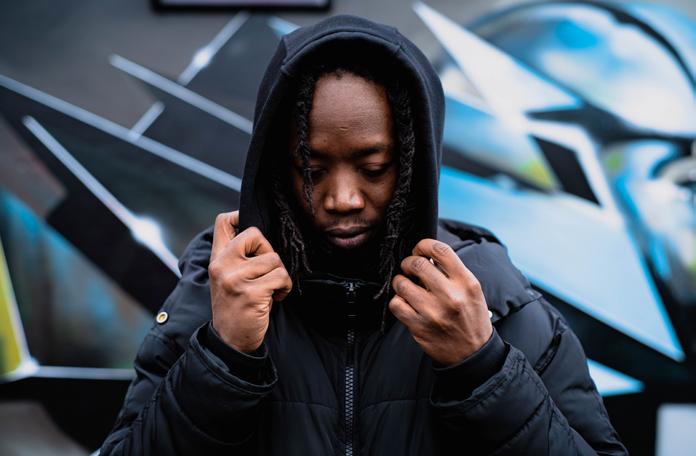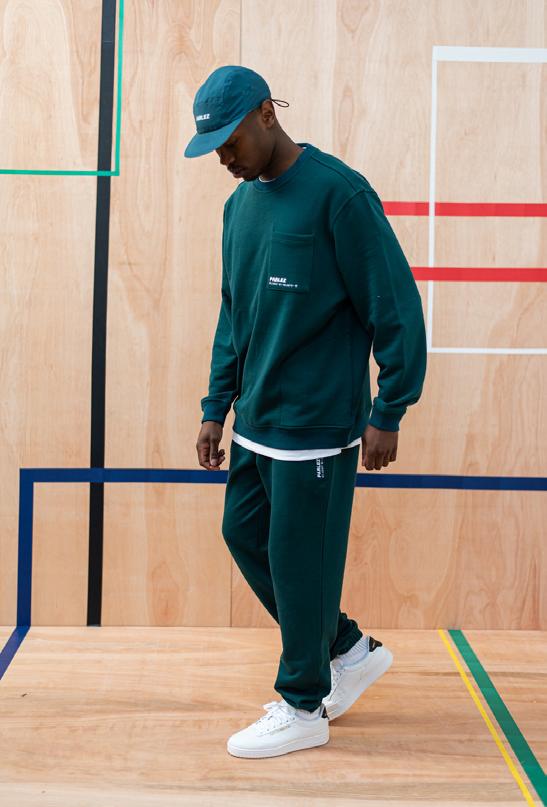
9 minute read
AFRONAUT ZU

Interview & Photos by Kate Vice
Advertisement
Afronaut Zu’s incredible voice was first brought to my attention when I finally made the trip to deepest New Cross to watch Steam Down, a collective of incredibly talented musicians and singers who perform 2 hours of improvised musical magic every Wednesday. The members rotate but that day it was Zu’s turn as lead singer. He came on stage almost completely covered up, mask on, hood up, locs obstructing what was left to see. Hmmm… curious. He took his time but as the night went on the mask came off, the hood came down and he unleashed a vocal tour de force of such primal emotion I was instantly hooked. His voice wouldn’t have been out of place at a Flamenco tablao or on an Arabic folk track. But also he can rap. Who the hell was this guy?
A quick Spotify search revealed a litany of collaborations, most notably with Rudimental, Netsky, Foreign Beggars and Dizzee Rascal. Plus an album of his very own, but apart from that there was not a shred of personal information to be had. How could this guy be everywhere and nowhere? Time to roll my sleeves up and get in touch.
We met at Hackney Wick and after the shoot we settled down with a pint so I could get his life story. I asked him to start at the beginning.
Born in London to Nigerian parents he explains that his parents were both contemporary African dancers and the family at large encompasses a variety of artistic a howl than a sing. It must have been pretty bad because there were a few instances where people were like ‘calm down’. I remember my school teacher said something along the lines of ‘keep the day job.’ Luckily that didn’t deter him and that ‘howl’ has now been harnessed into kind of a signature sound.
But change was just around the corner in so many ways. Not long after, he was shipped off to spend his formative teenage years in Nigeria. ‘I was livid, it was fucking surreal.’ And yet it was here that people started to appreciate his voice and encourage him, he says for many years he thought the compliments were a joke. Over time he came to love Nigeria, a love which is clearly core to
THERE WAS A LOT TO LEARN... YOU HAVE TO BE ON YOUR TOES!
talent. So surely a creative path was inevitable? ‘They’re still Nigerian, the focus was very much about school’. ‘I was always pretty good at dancing but my singing was apparently “horrible”.’
“What??” I exclaim.
‘Yo bro this story is mad to me too because I’ve always sounded the same to myself. Someone very close to me told me when I was in church back in the day, when I was 12 or 13, I think I must have been singing pretty loud…the way it was put to me was it was sounding a bit more like his identity as we see it today, from his stage name to his album art to his love of rapping in Yoruba.
When he reluctantly returned to the UK his focus was on acting. In an unlikely turn of events, an audition for a musical turned out to be a pivotal moment in his musical career. At the audition he met a like minded guy called Claima. Both equally uninspired by the musical theatre scene (‘no disrespect to people who love musicals’) they decided to start doing shows together.
‘We were all just into having fun and being challenged at that time.’ Claima put together a multidisciplinary collective called Lab Squared where Zu first started making music with Tinyman (also in Steam Down) and from there Tinyman created Orph Gang. Bear in mind Zu’s still in the original group he joined when he came back to the UK. ‘I’m a bit of a collective slut haha!’
‘But Orph Gang was different.’ There were eight members including one Kojey Radical. ‘It was a dope experience because we were very heavily performance based, we wanted to do things to a very high level…if anybody was about in Shoreditch at that time Orph Gang Live was one of the baddest shows. After Orph Gang Live we were basically locally famous.’
Next up were weekly acoustic Sundays at Boxpark even though he didn’t have his own songs. ‘I’m trying to work out how the fuck I did it.’ Did he freestyle? ‘Nooo I’m a terrible freestyler. I don’t know how I’m surviving at Steam Down. The Steam Down nights are improvisational nights. Actually I do, they’re a squad, we learn each other. They’ve got my back.’
Even though music was clearly his world he went to uni to study TV Production but he found it to be disturbingly exploitative so when the opportunity arose to travel the world touring with house DJ Damian Lazarus it was sayonara Shoreditch.
Incredibly, he says his focus was still acting and he viewed the music as a fun little side thing, even while he was touring the world. ‘It opened me up to dance music. That was key.’ His cultural perspective on dance music was ‘this isn’t for me’ but as the world of dance music embraced him he ‘couldn’t deny’ his reality any longer and he had to accept it was actually ‘really cool’. His array of life experiences are immediately evident in his genrespanning discography. Good luck pigeon-holing this guy.
Coming out of that he asked his manager to find a new tour. Another artist under her management had an audition for Rudimental but needed a bit of encouragement to go, so Zu said he would audition too. Shockingly, Zu wasn’t shortlisted. ‘It’s nothing personal, it’s a normal process.’ But in a twist of fate he did end up being called back for a second audition ‘and the rest is history’. He describes working with Rudimental as very personal. It’s not a dictatorship, they share ideas and criticisms. I ask what the most important thing he’s learned from it has been.
‘Their patience has taught me to be patient. There have been times when I didn’t understand what was going on and they could see why I was seeing things the way I was seeing them and they allowed me to get to the point where I understood. I think, if you really want to care in this industry, understand that the industry isn’t set up for people to care so you’re going to have to sacrifice. Touring with them is a really nice experience but over the last 4 or 5 years I’ve learned how much being nice costs them personally.’
‘You obviously really enjoy working with them.’
‘They put a lot of work into helping me understand and involving me in things. That’s how the Netsky collaboration came about.’
‘Lately you seem to be focusing quite a lot on drum n bass…’
‘I fucking love drum n bass. I’m a performer so I like things that are emotive. And I like things that are sure and drum n bass has that energy of 100% when this drops you’re losing your fucking mind.’
He explains that Rudimental allows him to do things his own way, it’s always their way but they make space for him to shine as an artist in his own right. ‘They’ve made a lot of effort to make sure I feel respected in that world. They’re amazing people.’
When asked about fame, something he has clearly avoided courting ‘there’s nothing wrong with being famous, but I feel like certain elements of fame aren’t healthy and with the personality type I have I don’t think it works for me.’ The crowds after Rudimental shows took him aback. ‘The stage is a controlled environment, even if on stage you lose control it’s still a controlled environment. Off stage is another matter’. Being mobbed by hundreds of people post show clearly wasn’t a situation he felt instantly comfortable with.
I remind him that we’ve skipped over the release of his album. ‘I’m not really a releasing music type of artist, I just wanna do the live stuff but we needed to create some context so I released Melanalia. Melanalia was… is, just the beginning of an idea for me. That was one of the times when my focus was very much Afro stuff. Like, what is going on with us? How is it that in different countries we’re experiencing similar things? As a young black man I have a problem with police everywhere. I’ve been to many countries and I don’t necessarily have an encounter with police in every country but I’m always aware to try and avoid that experience, that encounter, you understand? And I find that very odd. It shows me that the issue of black men and the police is a systemic issue. It’s not based on what country you’re in, it’s not based on whether you’re in a predominantly white or a predominantly black country, it doesn’t matter. I’ve actually been very blessed, very rarely have I had terrible experiences with the police, maybe two or three times. But as someone who feels they fall under the radar a lot, not even because I should, I just happen to experience that consistently. So I was getting into seeing the similarity between me and my peers both here and abroad. I started to look at what our relationship is with ‘back home’. But I felt like with Melanalia it needed to start with our experiences here. So it deals with some basic emotions, love, escapism…things that aren’t unique to Afro people in the UK but I’m just talking about what I’ve experienced as an Afro person. And that’s what Melanalia was about. I recognised a space which I’ve started to describe as ‘Afro-Psych’ music. I don’t think it’s necessarily important to the world, I think it’s going to be important to Afrodiasporians and maybe to Africans as well… and hopefully everybody else but I know who it’s for and why it’s for. I feel like in a world where for a long time we have not felt very well represented, this will be a space where you can just come and be yourself. It’s not about how commercially valuable this experience is, it’s about you just having this experience as an Afro person.’
‘Is there a feeling of operating in two worlds?’

‘Yeah, as Afrodiasporians we don’t actually have a space that can encompass all of us but we are surrounded by people who do. That creates some complexities and conflicts. So you end up in this grey world. And that’s where Melanalia is speaking from. Now, looking at it I feel like it’s a very grass roots beginning stage of understanding some of those concepts.’
Which segways nicely into his ongoing membership of Steam Down which is very much an Afro space, by ‘Afro kids, for Afro people’ that welcomes everyone but tolerates no bullshit. It’s a space and a concept, he says, that is needed not just in music but in all areas. Just like me, from the first time he attended he was hooked. ‘It blew my fucking mind. It blew my mind, for so many reasons. I’d grown up in a musical space but hadn’t seen music that I had grown up with evolve. But this was something that I could see was bordering on what I had heard before. And also it was a healing. The week dropped off, the month probably dropped off. I was spellbound. Spellbound, spellbound, spellbound. It felt like home immediately.’
‘Music is a spiritual tool and people are swinging swords like they’re sticks. At Steam Down we do things with intention. We use alchemy to make sure you have a decent week.’ And that artform is what makes him tick, more than money, more than fame.

What about another album? He says he’s really loving collaborating at the moment, and has a wealth of collaborations ready to drop but as far as his personal music goes he’s reluctant to keep buying into the Spotify and Apple business model. He no longer wants to be a part of a structure that keeps corporations wealthy and musicians poor. ‘I think the culture of exchange is something that I need to figure out how to change. Consumers can collect music in a better way and artists can share music in a better way, a more honest way.’
We’re both running really late so I ask about the future. ‘I just wanna have fun. I’ve got stuff to release this year. The main thing for me is that people need to come and have an analogue experience with Afronaut Zu. Come to through to shows. Steam Down is on tour this year. Fingers crossed Rudimental too. I’ve got a show in April opening for Brymo in London but the focus is Steam Down. If you want to be part of it you have to come through. See it for yourself and feel it for yourself.’
Check out his latest collaboration ‘Intalekt Presents: The Dojo Cypher’ on YouTube.
Be sure to follow @AfronautZu (IG) for the latest news and releases.





